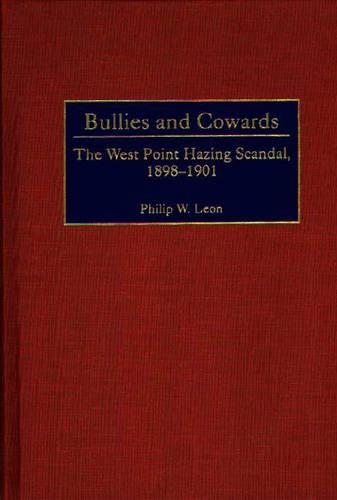
Bullies and Cowards: The West Point Hazing Scandal, 1898-1901
(Hardback)
Publishing Details
Bullies and Cowards: The West Point Hazing Scandal, 1898-1901
By (Author) Philip Leon
Bloomsbury Publishing PLC
Praeger Publishers Inc
30th December 1999
United States
Classifications
Tertiary Education
Non Fiction
Violence and abuse in society
History: specific events and topics
Violence, intolerance and persecution in history
355.0071173
Physical Properties
Hardback
208
Width 156mm, Height 235mm
425g
Description
When Oscar Booze entered West Point in 1898, the older cadets decided that he did not conform to their image of what a cadet should be. After four months of constant torment, including a beating in an organized boxing match, ridicule for reading his Bible, and the forced consumption of hot sauce in the cadet mess hall, he resigned. When Oscar died a year and a half later from tuberculosis of the larynx, his family claimed that the West Point cadets had killed their son by scarring his throat and creating a fertile field for the fatal infection. This is the story of the ensuing scandal that brought West Point under fire in the press nationwide. Investigations following Oscar's death would reveal a long-standing pattern of cruelty that had become inextricably identified with the academy, related to notions of social Darwinism and initiation rituals popular at the time. Both the House of Representatives and the Senate considered closing the Academy in light of testimony by cadets in two separate investigations that revealed cruel and sadistic practices. Distilling startling accounts from trial transcripts, contemporary newspaper stories, archival records and correspondence, this book exposes a little-known chapter in the history of West Point.
Reviews
"Bullies and Cowards provides us unique insights into cadet life at the Military Academy a century ago and skillfully reminds us that hazing erodes not only the spirit and will of young people, but also the highest ideals of any military institution."-Colonel Robert A. Doughty Professor of History United States Military Academy
"Philip Leon has exhaustively researched and superbly written the story of a century-old incident at West Point, flamed into a notorious scandal by the "yellow press" of the day. While the record shows the Academy to have been falsely maligned in the sad incident--which involved the death of a former cadet--the resulting investigation revealed an underlying maliciousness in a student body let run amok by a lack of controls. This book should be read and carefully pondered not only by officers and cadets at West Point, but by responsible persons at every college in America. Hardly dimmed by the passage of ten decades, much potential for such evil lurks on campuses still."-Dave R. Palmer President, Walden University
[Leon's] work is very valuable...because it presents a difficult historical situation that has great relevance to today's world, both civilian and military. The reader gains real insight into the problems and divisions that arise in a situation of intense mental pressure and demanding physical stress.-Army History
"Leon's work is very valuable...because it presents a difficult historical situation that has great relevance to today's world, both civilian and military. The reader gains real insight into the problems and divisions that arise in a situation of intense mental pressure and demanding physical stress."-Army History
"[Leon's] work is very valuable...because it presents a difficult historical situation that has great relevance to today's world, both civilian and military. The reader gains real insight into the problems and divisions that arise in a situation of intense mental pressure and demanding physical stress."-Army History
Author Bio
PHILIP W. LEON is Professor of American Literature at The Citadel. He is the author of William Styron (1978), Walt Whitman and Sir William Osler (1995), and Mark Twain and West Point (1996), along with numerous articles and essays. A retired Colonel of Military Intelligence, he served as a senior advisor to the superintendent at West Point from 1987 to 1990.
